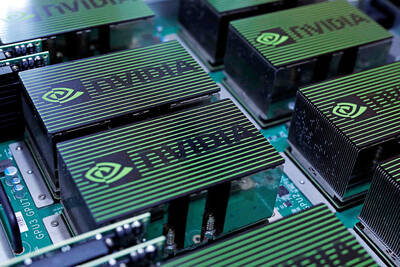The Switzerland-based high-end watch company Omega SA opened its first store in Taiwan yesterday and expects to see its sales in Taiwan grow between 10 percent and 15 percent from a year ago, a company official said yesterday.
Omega is owned by the Swatch group.
When asked whether rising inflation was expected to affect sales, Kevin Rollenhagen, head of The Swatch Group Ltd in the Greater China region said the company had not seen a strong impact so far.
Rollenhagen said Switzerland’s global exports of watches grew 15 percent year-on-year in the first five months of the year.
“The luxury brands are still doing quite well in a rather difficult economy, but the middle-priced brands will probably be suffering the most,” Rollenhagen said.
Phill Hwang (黃孔祥), general manager of The Swatch Group (Taiwan) Ltd (台灣斯沃琪瑞表), said during an opening speech yesterday that although Taiwan’s economy had not performed well in recent years, he believed opening the market to China would help.
In addition to the new Taipei store near the intersection of Zhongxiao and Fuxing roads, Omega operates department store booths at three locations and plans to expand its number of outlets to eight within two years, Hwang said.
Omega’s main consumer group in Taiwan consists of buyers between 30 and 40 years old. The average selling price of an Omega watch is between NT$150,000 and NT$200,000, Hwang said.

Leading Taiwanese bicycle brands Giant Manufacturing Co (巨大機械) and Merida Industry Co (美利達工業) on Sunday said that they have adopted measures to mitigate the impact of the tariff policies of US President Donald Trump’s administration. The US announced at the beginning of this month that it would impose a 20 percent tariff on imported goods made in Taiwan, effective on Thursday last week. The tariff would be added to other pre-existing most-favored-nation duties and industry-specific trade remedy levy, which would bring the overall tariff on Taiwan-made bicycles to between 25.5 percent and 31 percent. However, Giant did not seem too perturbed by the

AI SERVER DEMAND: ‘Overall industry demand continues to outpace supply and we are expanding capacity to meet it,’ the company’s chief executive officer said Hon Hai Precision Industry Co (鴻海精密) yesterday reported that net profit last quarter rose 27 percent from the same quarter last year on the back of demand for cloud services and high-performance computing products. Net profit surged to NT$44.36 billion (US$1.48 billion) from NT$35.04 billion a year earlier. On a quarterly basis, net profit grew 5 percent from NT$42.1 billion. Earnings per share expanded to NT$3.19 from NT$2.53 a year earlier and NT$3.03 in the first quarter. However, a sharp appreciation of the New Taiwan dollar since early May has weighed on the company’s performance, Hon Hai chief financial officer David Huang (黃德才)

UNPRECEDENTED DEAL: The arrangement which also includes AMD risks invalidating the national security rationale for US export controls, an expert said Nvidia Corp and Advanced Micro Devices Inc (AMD) have agreed to pay 15 percent of their revenue from Chinese artificial intelligence (AI) chip sales to the US government in a deal to secure export licenses, an unusual arrangement that might unnerve both US companies and Beijing. Nvidia plans to share 15 percent of the revenue from sales of its H20 AI accelerator in China, a person familiar with the matter said. AMD is to deliver the same share from MI308 revenue, the person added, asking for anonymity to discuss internal deliberations. The arrangement reflects US President Donald Trump’s consistent effort to engineer

NVIDIA FACTOR: Shipments of AI servers powered by GB300 chips would undergo pilot runs this quarter, with small shipments possibly starting next quarter, it said Quanta Computer Inc (廣達), which supplies artificial intelligence (AI) servers powered by Nvidia Corp chips, yesterday said that AI servers are on track to account for 70 percent of its total server revenue this year, thanks to improved yield rates and a better learning curve for Nvidia’s GB300 chip-based servers. AI servers accounted for more than 60 percent of its total server revenue in the first half of this year, Quanta chief financial officer Elton Yang (楊俊烈) told an online conference. The company’s latest production learning curve of the AI servers powered by Nvidia’s GB200 chips has improved after overcoming key component